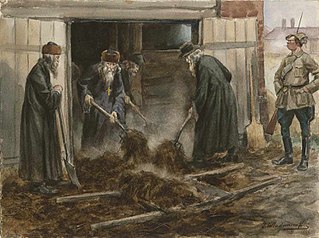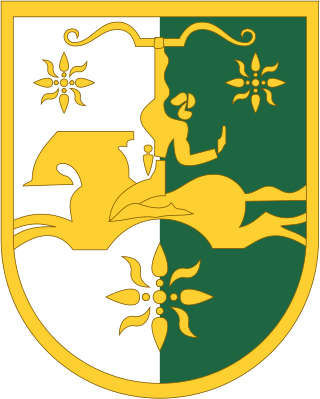
Debt bondage, also known as debt slavery, bonded labour, or peonage, is the pledge of a person's services as security for the repayment for a debt or other obligation. Where the terms of the repayment are not clearly or reasonably stated, or where the debt is excessively large the person who holds the debt has thus some control over the laborer, whose freedom depends on the undefined or excessive debt repayment. The services required to repay the debt may be undefined, and the services' duration may be undefined, thus allowing the person supposedly owed the debt to demand services indefinitely. Debt bondage can be passed on from generation to generation.

Coolie is a pejorative term used for low-wage labourers, typically those of Indian or Chinese descent.

Forced labour, or unfree labour, is any work relation, especially in modern or early modern history, in which people are employed against their will with the threat of destitution, detention, or violence, including death or other forms of extreme hardship to either themselves or members of their families.

A migrant worker is a person who migrates within a home country or outside it to pursue work. Migrant workers usually do not have an intention to stay permanently in the country or region in which they work.
The title of Hero is presented by various governments in recognition of acts of self-sacrifice to the state, and great achievements in combat or labor. It is originally a Soviet-type honor, and is continued by several nations including Belarus, Russia, and Ukraine. It was also awarded to cities and fortresses for collective efforts in heroic feats. Each hero receives a medal for public display, special privileges and rights for life, and the admiration and respect of the nation. Some countries without Soviet connections also award Hero honours.

Penal labour is a term for various kinds of forced labour that prisoners are required to perform, typically manual labour. The work may be light or hard, depending on the context. Forms of sentence involving penal labour have included involuntary servitude, penal servitude, and imprisonment with hard labour. The term may refer to several related scenarios: labour as a form of punishment, the prison system used as a means to secure labour, and labour as providing occupation for convicts. These scenarios can be applied to those imprisoned for political, religious, war, or other reasons as well as to criminal convicts.

Since its turn towards democracy in 1990, Mongolia has in principle acknowledged the concept of human and civic rights. "Human rights law," according to one human-rights organization, "is a rapidly expanding area in the Mongolian legal system." In September 2000, Mongolia unilaterally adopted the so-called "Millennium Goal 9", which is "to strengthen human rights and foster democratic governance." Writing in 2012 in the Jakarta Post, the secretary-general of the Indonesian Community who "led the first demonstrations for democracy and reforms in Mongolia," that "the passion for freedom and human rights" is "palpable in his being." Addressing an audience at the Asia Society in New York in 2011, Elbegdorj Tsakhia said: "Freedom, human rights, justice, the rule of law, those values can be enjoyed, even by the poor people, even by poor herdsman in Mongolia." The desire for human rights, he said, "is always there," in all people. "Sometimes that desire can be crushed by tyranny. But it will rise again. That is Mongolia."
Koreans in the Arab world used to form a major part of the worldwide Korean diaspora. Koreans started coming to the Arab world in large numbers in early 1970s as migrant labourers; between 1975 and 1985, 1.1 million Koreans came for work, which made it the third-most popular destination for Korean emigrants. Eventually, most returned home or moved on to other countries, and as of 2014, the South Korean government's own figures showed over 24 thousand of their nationals living in the region. However, South Korean nationals are present in all of the region's countries, and North Korean workers also have a growing presence in several of them.

The Republic of Abkhazia is a partially recognized state in the South Caucasus which declared independence from Georgia during the War in Abkhazia (1992–1993). At the time, the Soviet Union had recently collapsed (1991).
Mongolians in the Czech Republic form one of the country's smaller ethnic groups. Although the workers from Mongolia comprised 3.6% of the foreign workforce as of 2008, the group has grown over the last decade and numbered 10,236 men and women holding Mongolian nationality by June 2020. By 2011 they had declined both in numbers and in relative size to other foreign populations, having been surpassed by Russians and Moldovans. However, the group began to resume its growth after 2014 once again. Currently, a large group of Mongolians reside in the town of Česká Lípa and its surrounding area.

Contemporary slavery, also sometimes known as modern slavery or neo-slavery, refers to institutional slavery that continues to occur in present-day society. Estimates of the number of enslaved people today range from around 38 million to 49.6 million, depending on the method used to form the estimate and the definition of slavery being used. The estimated number of enslaved people is debated, as there is no universally agreed definition of modern slavery; those in slavery are often difficult to identify, and adequate statistics are often not available.
According to the United States Department of State, "Thailand is a source, destination, and transit country for men, women, and children subjected to forced labour and sex trafficking." Thailand's relative prosperity attracts migrants from neighboring countries who flee conditions of poverty and, in the case of Burma, military repression. Significant illegal migration to Thailand presents traffickers with opportunities to coerce or defraud undocumented migrants into involuntary servitude or sexual exploitation. Police who investigated reaching high-profile authorities also received death threats in 2015.
Koreans in Mongolia form one of the Korean diaspora communities in Asia. They consist of both North and South Korean expatriates.
Human trafficking in North Korea extends to men, women, and children for the purpose of forced labour, and/or commercial sexual exploitation for the trafficker.

China is a main source and also a significant transit and destination country for men, women, and children who are subjected to trafficking in persons, specifically forced labour and forced prostitution. Women and children from China are trafficked to Africa, Europe, Latin America, the Middle East, and North America, predominantly Taiwan, Thailand, Malaysia, and Japan for commercial sexual exploitation and forced labour. Women and children from Myanmar, Vietnam, Mongolia, former USSR, North Korea, Romania, Indonesia, Nepal, Pakistan, and Ghana are trafficked to China for commercial sexual exploitation and forced labour.

The kafala system or kefala system is a system in the Middle East that involves binding migrant workers to a specific employer throughout the period of their residence in a country. It currently exists in many Arab countries, especially those on the Arabian Peninsula. A similar "binding system" existed in Israel until 2006, when the Israeli Supreme Court addressed and eliminated it.

The Blood Bricks Campaign is an international campaign that focuses on fighting against the use of modern slavery in the Indian bricks kiln industry, while also exposing companies that use blood bricks in their supply chain. It was launched in 2014 by multiple, different organizations including Union Solidarity International (USi), Prayas, Action Aid Association, War on Want, and Thompsons Solicitors. This campaign's objectives include supporting unionizing efforts by workers, applying pressure to state and federal governments to enforce or amend laws, identifying companies that use bricks from bonded or forced labour, and bringing attention to the working conditions in the brick industry in India, as well as other parts of the world.
Sex trafficking in China is human trafficking for the purpose of sexual exploitation and slavery that occurs in the People's Republic of China. It is a country of origin, destination, and transit for sexually trafficked persons.

The treatment of South Asian labourers in the Gulf Cooperation Council (GCC) region is an ongoing issue between members of the South Asian Association for Regional Cooperation (SAARC) nations and the wealthy oil-rich Gulf Cooperation Council. The current large number of migrants from South Asia to the Persian Gulf began in the 1960s, when the oil boom in the Gulf Arab countries resulted in migrant labourers. This further increased with the development of large mega-cities. With the growth of megacities of Dubai, Doha and Riyadh, the need for construction labourers grew. Migrants from Bhutan, Nepal, Pakistan, India, Sri Lanka, Bangladesh, and Maldives were contracted to develop the mushrooming skyscrapers. Many of these migrants were brought into the GCC under the kafala system, a sponsor-based system used in the GCC, which is seen by many human rights groups as highly exploitative, since their passports are confiscated and they are forced to work in low-level conditions, within cramped living quarters, for a low salary, and sometimes even without their due pay; when exploitation is brought up or exposed by media or the labourers, their employers are rarely punished.

Migrant workers in Russia, commonly referred to as Gastarbeiters, form a significant part of Russia's workforce since the dissolution of the Soviet Union. Comprising as much as 25% of the workforce, the majority of migrant workers come from Central Asia and the South Caucasus, and often work in low-level jobs.










